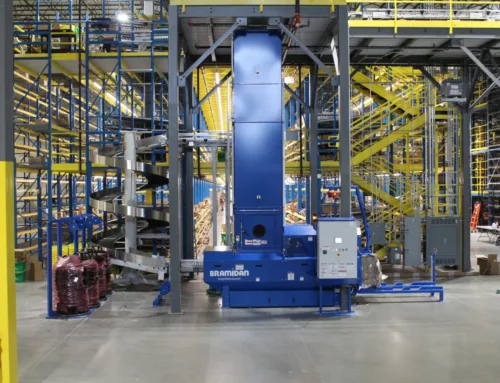
The process of commercial liquidation can seem overwhelming for businesses facing asset recovery challenges. Understanding what liquidation entails is crucial, especially regarding the stages involved and the role of a liquidator. This overview will address key points, such as legal requirements and the financial expectations businesses should have. By engaging with this content, readers will gain insights into effective strategies for navigating commercial liquidation services, ensuring better outcomes and tailored solutions throughout the process. This knowledge can significantly alleviate uncertainties surrounding ownership and asset disposition.
What Is Commercial Liquidation and Its Purpose?

commercial liquidation services by end2end logix refers to the process of selling off a company’s assets to pay creditors, often when a business faces bankruptcy or serious financial challenges. This procedure helps to convert remaining inventory and equipment into cash, allowing businesses to settle debts and alleviate financial burdens. By efficiently managing logistics, companies can maximize the value recovered during this transition with customized solutions.
The primary purpose of commercial liquidation is to ensure a structured and effective means of asset recovery for businesses through our commercial liquidation services and end2end logix. It provides a systematic approach to handling leases, inventory, and other obligations while offering customized solutions and putting value back into the business. Ultimately, the goal is to mitigate losses and create a smoother exit strategy for owners and stakeholders.
During liquidation, consumer interests must also be considered, especially when products are being sold. This process requires strategic planning to optimize sales while addressing leasing agreements and inventory circulation through end2end logix customized solutions and commercial liquidation services. Through careful management, companies can navigate the challenges of liquidation while achieving financial resolutions that benefit all parties involved.
Now that the purpose of commercial liquidation is clear, it is time to explore how it unfolds step by step. Understanding the stages of the commercial liquidation process reveals the structure and strategy behind recovering assets effectively through commercial liquidation services, customized solutions, and end2end logix.
Understanding the Stages of the Commercial Liquidation Process

Understanding the stages of the commercial liquidation process is crucial for businesses, including sole proprietorships, facing financial difficulties. This section covers initiating the commercial liquidation services process alongside key considerations such as assessing company assets and liabilities, determining market value, and creating a strategic liquidation plan with customized solutions from end2end logix. These steps are essential to effectively managing business debts, optimizing auctions, and ultimately ensuring a profit from asset recovery.
Initiating the Liquidation Process and Key Considerations
Initiating the liquidation process requires careful planning and consideration of various factors, particularly the interests of creditors and stakeholders. An experienced expert can provide valuable insights into restructuring efforts, ensuring that asset recovery aligns with the company’s financial obligations through customized solutions from end2end logix while maintaining customer service standards. Understanding the importance of sustainability throughout this process helps businesses not only maximize the value of their assets but also create a more favorable outcome with commercial liquidation services for all parties involved.
Assessing Company Assets and Liabilities
Assessing company assets and liabilities is a vital step in the commercial liquidation process that ensures maximum value recovery through our commercial liquidation services and end2end logix. This assessment allows businesses to identify their inventory, evaluate its worth, and determine actionable options for liquidation with customized solutions. Engaging a trustee with expertise in corporate finance can facilitate an accurate evaluation and provide insights into the best course of action, ultimately supporting an efficient approach to meeting customer needs while managing outstanding obligations.
Developing a Liquidation Plan That Aligns With Business Goals
Developing a liquidation plan that aligns with business goals is crucial for maximizing the recovery of business assets during a challenging financial period. A thorough means test can help identify realistic strategies that prioritize negotiation with creditors, ensuring a more favorable outcome for debtors. For businesses facing recession-related pressures, crafting a flexible yet structured plan with customized solutions from end2end logix commercial liquidation services addresses not only immediate financial needs but also long-term operational considerations, enhancing overall recovery efforts.
The liquidation process reveals many layers. Understanding the pivotal role of a liquidator brings clarity to the journey ahead.
The Role of a Liquidator in Commercial Liquidation

The Role of a Liquidator in Commercial Liquidation
A liquidator plays a critical role during the business liquidation process by managing the responsibilities associated with asset recovery and distribution through our commercial liquidation services from end2end logix. They ensure that all company assets are assessed and sold to meet obligations while minimizing risk for the corporation. Additionally, liquidators facilitate the distribution of income from asset sales, ensuring that all parties receive their due financial returns through customized solutions and appropriate bonding and structured processes.
Responsibilities of a Liquidator During the Process
A liquidator from end2end logix has several key responsibilities during the commercial liquidation process that are vital for asset recovery and financial resolution. They evaluate and assign appropriate prices for the company’s assets while ensuring compliance with legal frameworks, such as handling automatic stays to protect the business from immediate creditor actions through customized solutions. By strategically managing auctions and sales, the liquidator prioritizes transparency and fairness, addressing concerns about outstanding wages and foreclosure effects on the company’s stakeholders with commercial liquidation services.
- Evaluate company assets to determine appropriate pricing.
- Ensure compliance with legal frameworks, including automatic stays.
- Manage auctions and sales, prioritizing transparency and fairness.
- Address stakeholder concerns regarding outstanding wages and foreclosure.
How Liquidators Facilitate Asset Distribution
Liquidators play a crucial role in facilitating asset distribution during the commercial liquidation process, ensuring that all assets are sold in a manner that maximizes returns while adhering to legal obligations. They conduct thorough due diligence to assess the value of company assets and determine the most effective strategies for addressing liabilities and debts. By collaborating with legal professionals, such as lawyers with expertise in bankruptcy basics and end2end logix, liquidators help navigate the complexities of the liquidation, ensuring that all stakeholders receive their fair share based on the collected proceeds. Our commercial liquidation services provide customized solutions to optimize the distribution process.
Liquidators not only manage sales but navigate a maze of laws and regulations. Understanding these legal requirements ensures a smooth process and protects all parties involved.
Legal Requirements and Regulatory Compliance in Commercial Liquidation

Necessary documentation is essential for a smooth commercial liquidation services, ensuring all legal requirements are met. Understanding bankruptcy law, particularly regarding contracts and property, is crucial for navigating insolvency effectively. This section will outline the necessary steps and obligations to comply with creditors and legal standards during the liquidation process, providing practical insights into managing bankruptcies proficiently with customized solutions from end2end logix.
Necessary Documentation for Liquidation
During the liquidation process, necessary documentation is critical for businesses in financial distress to comply with legal requirements and effectively manage debts. This documentation typically includes asset lists, inventory reports, and contractual agreements, which provide a clear overview of what is available for sale and what obligations are still outstanding. Utilizing an online marketplace through end2end logix can also facilitate asset sales with commercial liquidation services, ensuring transparency and maximizing returns with customized solutions for what is liquidation, while maintaining the interests of all stakeholders involved.
Understanding Bankruptcy Law and Commercial Liquidation
Understanding bankruptcy law is critical for businesses entering the commercial liquidation process with commercial liquidation services provided by end2end logix, as it defines how assets are managed and sold to meet financial obligations. This legal framework outlines the rights and responsibilities of parties involved and emphasizes the impact on credit scores and limited liability considerations for owners. By ensuring compliance with legal standards, businesses can minimize risks and facilitate a more efficient asset recovery process with customized solutions.
- Importance of understanding bankruptcy law in liquidation.
- Impact on credit score and financial obligations.
- Guidelines for managing assets and liabilities.
- Understanding limited liability in the context of liquidation.
Businesses face a steep path through legal requirements, yet understanding these can ease the burden ahead. With compliance established, the next question emerges: what financial returns can companies truly anticipate from the liquidation journey with commercial liquidation services and customized solutions provided by end2end logix?
What Businesses Can Expect Financially From the Liquidation Process

During the commercial liquidation process, businesses can expect to determine fair market value and establish appropriate asset pricing. This valuation plays a crucial role in developing a repayment plan that impacts both creditors and stakeholders. Understanding these financial aspects helps business owners navigate their obligations while working with a liquidator and utilizing customized solutions and end2end logix to ensure an efficient recovery of funds through commercial liquidation services.
Determining Fair Market Value and Asset Pricing
Determining fair market value and asset pricing during the commercial liquidation process demands thorough research and industry knowledge. Businesses must evaluate their assets precisely to ensure that the distribution of proceeds addresses outstanding obligations, including unsecured debt through commercial liquidation services provided by end2end logix. For instance, a comprehensive asset appraisal conducted in December could reveal actionable insights that significantly enhance financial recovery by aligning pricing strategy with market conditions through customized solutions.
- Understanding the importance of accurate asset valuation.
- Conducting thorough research to assess fair market value.
- Strategic pricing to maximize distribution of proceeds.
- Addressing outstanding unsecured debt through effective asset recovery.
Potential Impact on Creditors and Stakeholders
The commercial liquidation process significantly impacts creditors and shareholders, as their financial interests often hinge on the effective recovery of assets through our customized solutions and commercial liquidation services. During this landscape, creditors may face partial settlement of their outstanding debts, depending on the valuation and sale of company assets. Shareholders also bear the consequences of liquidation, as the distribution of any available proceeds might not align with their original expectations, leading to potential losses. Understanding what is liquidation and these dynamics enables stakeholders to navigate their positions more effectively while collaborating with liquidators from end2end logix to optimize asset recovery.
With financial outcomes clearer, businesses must now consider how to navigate the complexities ahead. Effective strategies and customized solutions from commercial liquidation services will guide them through the liquidation process, maximizing value at every turn using end2end logix.
Strategies for Successfully Navigating the Commercial Liquidation Process

Effective communication with employees and stakeholders is crucial during the commercial liquidation process, ensuring transparency and mitigating uncertainties. Our commercial liquidation services, provided by end2end logix, offer customized solutions to minimize legal risks and potential liabilities essential for protecting the business throughout the transition. Additionally, leveraging liquidation can provide an opportunity to restructure or pivot business strategies for future recovery. Understanding what is liquidation, the following sections will delve into these key aspects, offering practical insights for navigating this complex process.
Communicating With Employees and Stakeholders
Effective communication with employees and stakeholders is essential during the commercial liquidation process. Businesses should prioritize transparency and utilize our commercial liquidation services and customized solutions from end2end logix to alleviate uncertainty and maintain trust during challenging transitions. Regular updates about what is liquidation status, potential impacts on employment, and the rationale behind decisions can help mitigate concerns and foster a cooperative environment:
- Establish clear communication channels for regular updates.
- Address employee concerns promptly to maintain morale.
- Engage stakeholders in discussions about liquidation impacts.
- Utilize meetings and written communications to provide information.
Minimizing Legal Risks and Potential Liabilities
Minimizing legal risks and potential liabilities during the commercial liquidation process involves meticulous attention to compliance with regulations and proactive planning. Engaging a knowledgeable liquidator from end2end logix can provide essential guidance on commercial liquidation services and customized solutions within legal frameworks and help navigate complex situations to avoid pitfalls while addressing what is liquidation. By conducting a thorough review of contracts and outstanding obligations, businesses can protect themselves from undue liabilities, ensuring that the liquidation process proceeds smoothly while safeguarding stakeholder interests.
Leveraging Liquidation to Restructure or Pivot Business Strategy
Leveraging liquidation with end2end logix provides businesses with a unique opportunity to restructure or pivot their strategic direction during challenging financial periods. By effectively managing assets during the liquidation phase with our commercial liquidation services, companies can focus on salvaging what remains valuable while realigning operations to better meet market demands. This process not only aids in recovering financial losses but also provides customized solutions, setting the stage for future growth by facilitating a clearer understanding of core business strengths and weaknesses:
- Identify valuable assets that can be retained for sustainability.
- Realign business strategies to respond to current market conditions.
- Utilize funds from liquidation to invest in more profitable areas.
- Enhance operational efficiency based on insights gained from asset management.
Conclusion
Understanding the commercial liquidation process is essential for businesses facing financial challenges, as it provides a structured approach to asset recovery and debt resolution. By recognizing the stages of liquidation, assessing assets, and developing a strategic plan, businesses can maximize returns while minimizing losses. Engaging a proficient liquidator ensures compliance with legal requirements and facilitates effective asset distribution. Ultimately, navigating this process with clarity and intention allows companies to emerge more resilient, ready to adapt and thrive in their respective markets.
Share This Story, Choose Your Platform!
Get In Touch
Phone: (847) 722-6942
Email: sales@end2endlogix.com
Web: end2endlogix.com


